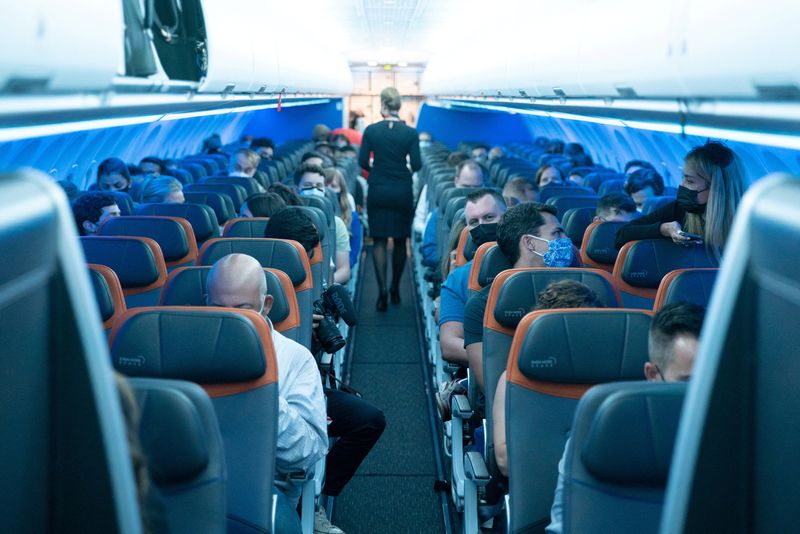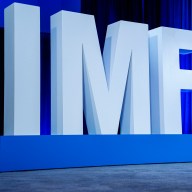CHICAGO (Reuters) – Robin Hayes, the ebullient chief executive of JetBlue Airways Corp, was on an Amtrak train on Tuesday coming back from Boston when news broke that his company had made an offer to acquire Spirit Airlines Inc.
Hayes said the company was not yet ready to go public with its offer for the ultra-low-cost carrier, but the news leak forced its hand. On a conference call the next morning, the reasons were apparent as JetBlue struggled to convince investors of the rationale behind its unsolicited $3.6 billion bid.
The surprise move by the New York-based carrier has baffled Wall Street because it seeks to combine two companies with very little in common other than fleets dominated by Airbus SE jets. As a result, the deal is expected to be very expensive for JetBlue, which raises questions about any assumed synergies.
JetBlue did not immediately respond to a request for comment.
The company’s stock has fallen about 19% since the news broke. JetBlue shares were down 4.2% at $11.92 on Thursday afternoon.
A main concern of investors is the starkly different business models of the two carriers.
Spirit is a no-frills carrier that relies on fares stripped down to the lowest possible level, supplemented by charges for extras such as booking through a call center, a strategy known as unbundling.
The success of its business model is driven by a low cost structure that has allowed it to offer low base fares and maintain high profit margins.
In contrast, JetBlue is a premium leisure airline. Its offerings include free checked bags, an assortment of complementary food and private suites.
Hayes is promising lower fares following the deal’s completion. Delivering on that promise, however, would be a tall order, analysts say.
JetBlue’s costs and fares are already higher than those at Spirit and other ultra-low-cost carriers. Since the company would have to raise salaries of Spirit pilots to bring them in line with its pay structure, the cost pressure is expected to worsen.
Savanthi Syth, airline analyst at Raymond James, estimates wages for Spirit pilots would need to increase in the range of 7% to 51% to reach parity with JetBlue’s current rates.
The company also plans to retrofit Spirit’s fleet in order to provide more leg room and a “superior” onboard experience to customers, which it said would be a multiyear investment. Industry experts say the move would leave the airline with fewer seats to fill with passengers, resulting in lower productivity.
Equally daunting will be the task of integrating the culture of two airlines that have been following different service models. JetBlue told investors that cultural integration would be critical to the deal’s success.
Aviation analyst Robert Mann reckons JetBlue’s offer was “rushed to market.” “Everybody is kind of somewhere between pulling their hair out and just dismissing it,” he said.
‘A WINDOW OF OPPORTUNITY’
JetBlue, however, views the deal as a way to expand its domestic footprint amid persistent labor and aircraft shortages. It tried to buy Virgin America in 2016, but lost out to Alaska Air Group Inc.
Hayes said the company had been thinking about how to pursue growth for a long time. And once budget carrier Frontier Group Holdings Inc announced a deal in early February to merge with Spirit, he said it created “a window of opportunity that if you don’t act in it, it’s gone.”
The company is betting a combination with Spirit would accelerate its growth in Florida and Los Angeles and open up opportunities in Las Vegas, Dallas, Houston, Chicago, Detroit, Atlanta and Miami.
Following the deal, the two carriers will have a combined fleet of 455 aircraft, with deliveries of another 220 jets from Airbus expected by 2027. It offers greater flexibility at a time when airlines cannot get new aircraft delivered fast enough.
Henry Harteveldt, founder of travel consultancy Atmosphere Research Group, said growing in size would also allow JetBlue to attract pilots by offering them better careers.
“Clearly, the airline wants to be more than just a domestic airline,” Harteveldt said. “So a combined JetBlue and Spirit would be appealing to pilots who want to work for a growing airline in the future.”
EXECUTION RISK
Despite these potential long-term benefits, industry experts say the deal is fraught with execution risks.
Veteran budget airline investor Bill Franke, who masterminded Frontier’s tie-up with Spirit, once said that failing to remain disciplined about the business model and allowing other costs to creep in was the “path to hell” for airlines.
Franke stuck to that formula in the deal with Spirit. The two carriers not only have no-frills business models but also have highly complementary networks and both use Airbus jets.
In comparison, JetBlue and Spirit have a high degree of concentration in South Florida, which is expected to draw scrutiny from regulators.
Analysts at UBS said while the merits of a Frontier-Spirit combination were more straightforward, JetBlue’s bid was a “head-scratcher.”
The prospect of a tie-up between ultra-low cost and hybrid business models is reminiscent of Wizz Air Holdings Plc’s unsuccessful overtures toward Britain’s Easyjet Plc last year, which the latter rejected.
Wizz is also part of Franke’s investment stable, though his support for a move that seemingly breaks his own investment rule was unclear. Analysts at the time questioned the mixing of airline types, in what proved to be a precursor of the present debate over JetBlue’s strategy.
“It’s kind of half-baked, honestly,” said analyst Mann, referring to JetBlue’s bid.
(Reporting by Rajesh Kumar Singh in Chicago; Additional reporting by David Shepardson in Washington; Editing by Matthew Lewis)













